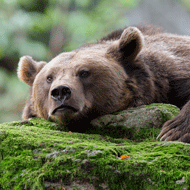Brown bear study offers clues on metabolism

Variations in the bears' feeding habits go hand-in-hand with major changes in their gut microbiota.
A study of free-roaming brown bears in Sweden could offer new insights into how gut microbiota affects metabolism in humans.
Brown bears range from extreme energy consumption in the summer months, to zero intake for up to six months during winter hibernation.
But despite the large fat accumulation, they remain metabolically healthy – unlike humans where we see a strong association between obesity and insulin resistance.
According to new research published in the journal Cell Reports, variations in the bears' feeding habits go hand-in-hand with major changes in their gut microbiota.
Scientists from the University of Gothenburg in Sweden transferred the bears' gut microbiota to germ-free mice and found that the mice who received summer microbiota had an increased capacity to store fat.
"Especially interesting was the notion that the mice became fatter without developing insulin resistance, similar to the bears from where the microbiota was obtained..." said lead author Fredrik Bäckhed.
"The bear study provides new knowledge on how gut microbiota affects our metabolism, a finding that may help us to develop bacteria based treatments in the future."
Studying 16 wild brown bears, the team found that in winter, the concentration of several molecules in the blood increased, which is believed to be a reflection of changes in their gut microbiota. Scientists also observed an increase in microbial diversity in summer.
Previous research has shown that metabolism-related diseases such as diabetes, obesity and coronary heart disease are linked to bacterial changes in the gut.
Prof Bäckhed said more work is needed to identify any practical applications for the latest findings.
Read the full study here: http://www.cell.com/cell-reports/fulltext/S2211-1247%2816%2900047-4



 The Animal and Plant Health Agency (APHA) has updated its online reporting service for dead wild birds.
The Animal and Plant Health Agency (APHA) has updated its online reporting service for dead wild birds.